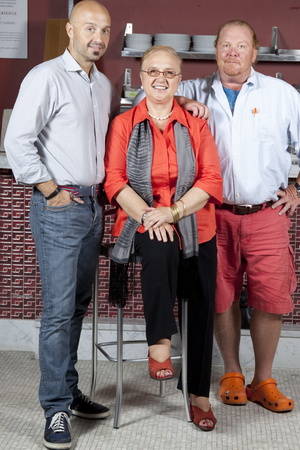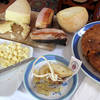Lidia Stops the Clock: Eataly is Opening Around the Block!
We are finally there. Eataly, a 70,000 sqf fully Italian food&wine shopping mall is ready to welcome thousands of New Yorkers
Local media and the general public have supported Oscar Farinetti’s project to bring his Eataly to New York right from when it was first conceived and announced, and now they are showing deep enthusiasm and expectations towards it.
The same for Lidia Bastianich, whom we reached on the phone to talk about her emotions on the eve of the ribbon cutting event. Lidia, together with her son Joe and chef Mario Batali, is in fact Eataly’s main partner in this new US adventure.
For all those who know her it is no wonder that she embraced the ‘Eataly challenge’ from the very first moment she was told about it. As she explained us, she sees it as a fabulous opportunity to educate the American public on authentic Italian cuisine and the traditions and values on which it relies.
What got you involved in the Eataly project?
I first met Oscar Farinetti, the creator and founder of Eataly through the Slow Food Association during one of my trips to Italy. I had heard about Piedmont’s Eataly before, and I was curious about it. I was very impressed by Mr. Farinetti: our relationship begun and developed very quickly. We had dinners together and we met several times before he asked me how I felt about Eataly coming to New York. I thought that the concept on which the whole project relayed was great, but I needed to ask my partners, my son Joe and chef Mario Batali, with whom I run the B&B Hospitality Group, what they thought about it. They liked the idea, and we started working on it right away
How will you be involved with Eataly’s management and growth?
The three of us will take care of different sectors. My son Joe will be the CEO, and will run the entire business; Mario Batali will supervise the restaurants, the menus, and the chefs, making sure that the food will represent us and the Italian tradition properly; my court will be education and catering.
I want to make of Eataly a forum where people have the opportunity to learn more about Italian tradition, and can get more conscious and aware about the products that they buy. My collaborators and I will hold a number of classes every year, in which not only we will teach our students about Italian recipes and the ways to prepare them, but will also invite Italian wine makers, artisans and producers. They will talk about their businesses, hold tastings, or dinners based on their products.
We will also host several lectures every year embracing the many different aspects related to food: we will talk about its nutritional aspects, focusing on the Mediterranean Diet as a delicious, healthy way of eating and drinking; the historic ones, focusing on how the different cultures and populations that occupied Italy throughout history--from the Arabs to the Spanish and the French -- changed and shaped local culinary traditions; and finally we will touch the sociological aspects of eating the Italian way. Think about it: everybody admires and appreciates the Italian habit to sit around the table with our family and enjoy a good meal. It is part of our daily life, it is a must to which we should not renounce. It helps keeping our families together, and I think that Americans should learn a lot from this tradition.
Finally, let me anticipate that we will also organize both local and international trips. We will visit local producers but we will also invite folks to fly to Italy with us, and learn more about the products that they are buying at Eataly in New York.
As a matter of fact Eataly could become a real booster for the Italian food & wine tourism industry...
Our clients will find in Eataly also high-quality, niche products coming from areas of which they probably had never heard about. This will certainly stimulate them to visit places that are generally not interested by mass tourism and learn about the many fascinating aspects of their culture, starting from the food & wine one.
A question to Lidia in her capacity capacity as chef. Why is it so important to use authentic Italian ingredients to cook Italian?
I opened my first restaurant, Buonavia, in 1971, as my first effort to communicate the traditional Italian culinary culture to the American public. I must say that it was very difficult: at that time, for example, I didn’t even have the proper rice to make a risotto. There was no Carnaroli or Arborio rice available in the States, and I had to use locally grown long grain rice to cook. The results were very far from what they should have been.
It soon became clear to me that in order to export Italian cuisine to the US I first needed traditional ingredients to be available. If you can make an antipasto with Prosciutto San Daniele, Mozzarella di Bufala, Grana Padano, and use good olive oil, you’re half the way through. You put them on the table, close your eyes, and feel like being back in Italy....
If you want to cook Italian, however, the ingredients alone are not enough. You need to learn the technique, the Italian way to cook and make a dish out of them. How do you cook osso buco, or pasta e fagioli? You need to get the skills for it.. that’s why I am betting so much on the educational aspect of my commitment with Eataly.
You decided to sell also local products, beside those imported from Italy. This choice reflects the “Italian spirit” -- for Italians cook only with what is in season and they can find “in their backyard.” This is also sustainable from an ecological point of view. But how do you respond to those who criticize it, especially when it comes to products such as as mozzarella, that you buy from local producers?
If you asked a Neapolitan how long the mozzarella stays fresh, he will answer that it should be eaten within two hours of its shaping, which is not possible when you have to import it from Italy. I find it true that buffalo mozzarella can not be substituted adequately with any other US product, but I would not say the same for regular mozzarella: if you have good milk, and you get a good curdle, knowing the temperature and the right techniques, you can make a product that is very similar to the Italian one. It is still not 100% the same, but it is getting closer and closer, and personally I use it for my dishes.
The same with fish. Why should I import scampi from the Italian Riviera, and have them frozen to get all the way here, when I can easily get local and fresh ones? If I have a good Italian olive oil and I cook them the Italian way, I can still get very close to the original taste.
New Yorkers seem very enthusiastic about the opening of Eataly. Why is Italian cuisine so popular in the US?
Italian cuisine is much more than a sterile collection of recipes: it reflects the people with their way of living, their habits, the hundreds of different cultures characterizing the different areas of the country. In the 40 years that I have been working in this business, I have seen the interest of people towards it and its history growing exponentially. They are curious about the different traditions, and like to experience them at the table. The same phenomenon is happening with Chinese cuisine, that is also very rich from the cultural point of view. In my opinion, however, the one thing that makes of the Italian cuisine the most popular in this country is that it is associated with the idea of family, with the pleasure of making something special out of the ingredients you have available and sharing it with your dear ones.
Talking about family, it’s several years by now that you are partner with your son Joe. How is it working out?
In my family we like to follow the Italian tradition also when it comes to business. Italy is the only power in Europe whose economy relies on medium and small family-run businesses, and I find it very healthy, both for the business and for the family.We discuss, confront our ideas, and try to do our best to make things work out properly in the interest of everybody. Of course we argue sometime, but we always find a way out, and that’s because we are bonded together in a double way.
I also work with my daughter Tanya, a Ph.D. in Renaissance History from Oxford University, who helps me with my books doing research, that is her field of expertise.
I have been fortunate enough to be a mother of two children who share her same passions, and work to make them flourish every day. It’s one of the greatest rewards that I could have hoped for.
We concluded our phone call wishing Lidia and her partners the best success in their new adventure. As she anticipated to us, the project could expand throughout the US, depending on the outcome of this first New York experiment. In the meantime, New-yorkers, be them of Italian origins, or just Americans who love Italy will from now on have a place to shop, dine, and experience even if just for a few hours the sweet flavor of the Italian dolce vita.









































i-Italy
Facebook
Google+
This work may not be reproduced, in whole or in part, without prior written permission.
Questo lavoro non può essere riprodotto, in tutto o in parte, senza permesso scritto.